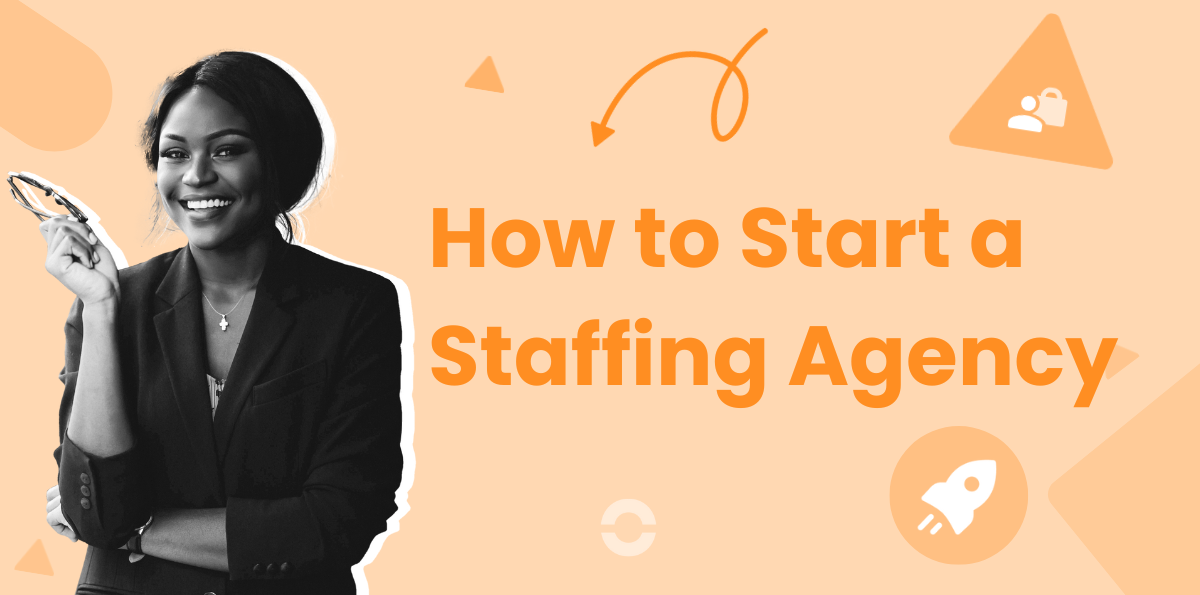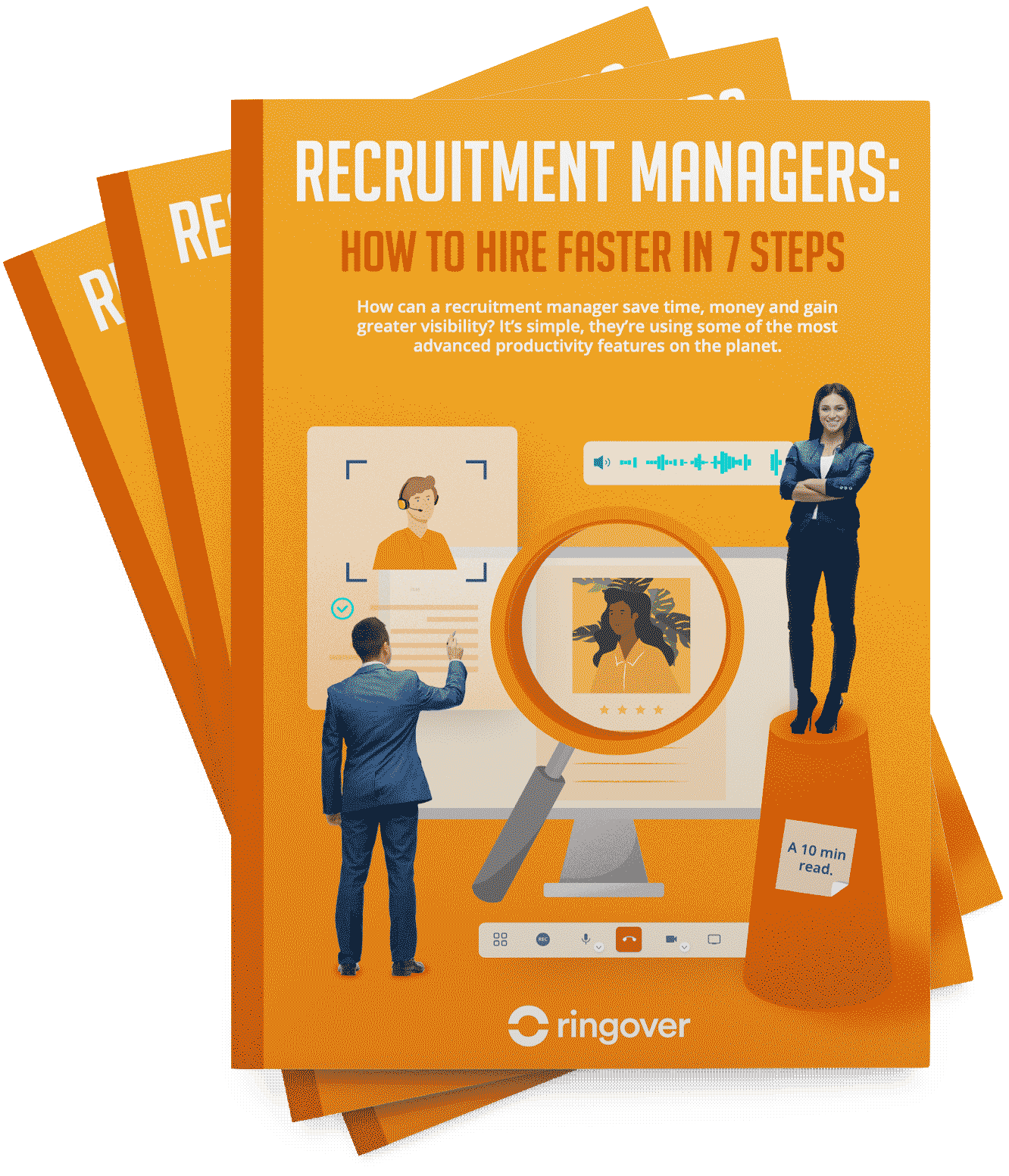Summary
As you set out to establish your staffing agency, you will undertake several vital steps, including pinpointing your niche, formulating an in-depth business plan, securing the necessary licenses, and assembling a proficient team. This guide aims to steer you through the 15 essential steps for starting a staffing agency, from the initial planning phase to achieving operational success.
Discover Ringover for RecruitmentWhat Is a Staffing Agency?
A staffing agency, also known as a recruitment or staffing firm, serves as an important intermediary between job seekers and companies looking to fill various positions. These agencies specialize in matching the right candidates with the appropriate job openings, streamlining the hiring process for both parties involved.
At its core, a staffing agency is responsible for the entire recruitment process. This includes creating job descriptions based on the client's requirements, advertising the positions on job boards and professional platforms like LinkedIn, reviewing applications, conducting interviews, and performing background checks if necessary.
Staffing agencies offer a range of employment options, including temporary, temp-to-hire, and direct hire positions. Temporary positions involve assignments with a set start and end date, while temp-to-hire roles are initially temporary but can lead to permanent employment if the candidate proves to be a good fit.
How to Start a Staffing Agency
1. Find Your Niche
Choosing a specific industry or market segment, such as technology, healthcare, or hospitality, where you have expertise and observe a high demand, is vital. Specialization enables you to distinguish your agency and enhance your recruitment efficiency.
2. Evaluate Your Skills
It's important to assess your own skills and those of your potential team members in areas such as client acquisition, candidate matching, and operational management. If you identify any skill gaps, consider bringing in professionals to complement your capabilities.
3. Develop a Business Plan
Construct a detailed business plan that outlines your executive summary, market and competitive analysis, marketing strategy, financial projections, operational guidelines, and management structure. This document will act as a roadmap and assist in overcoming future challenges.
4. Ensure You Have the Capital
Starting a staffing agency requires a substantial initial investment for expenses such as office space, insurance, legal fees, software, office supplies, employee salaries, and marketing. The total startup cost can range between $60,000 and $130,000, depending on your business's size.
5. Form a Legal Entity
Select a business structure like a sole proprietorship, partnership, LLC, or corporation. Register your business through the U.S. Small Business Administration website and secure the necessary licenses and permits. This step is essential for liability protection and tax compliance.
6. Obtain Necessary Licenses and Permits
Acquire all required licenses and permits, which may vary based on your location and the services you provide. Common requirements include a general business license, Employment Agency License (in some states), and an EIN (Employer Identification Number).
7. Open a Business Bank Account
Establish a dedicated business bank account to keep your personal and business finances separate. This is essential for effective cash flow management and financial transparency.
8. Set Up Operations and Workflows
Decide on an office location, be it traditional or remote, and invest in essential technology and equipment to efficiently manage clients, candidates, and job orders. Typical business software useful for staffing agencies include ATS like Bullhorn and Vincere, and an omnichannel contact center software helps you stay close to both clients and candidates.
One such example of a multichannel communications platform is Ringover, which offers text messaging, video calling, unlimited calling to over 110 international destinations, and more. This VoIP phone offers many benefits that support staffing agency operations.
- Call Logging and Tracking: Automatically log all call activities in your CRM or hiring management software, including Avionté and more, ensuring that every client and candidate interaction is documented. This feature helps recruiters stay organized and provides easy access to previous conversations.
- Click-to-Call: Enable recruiters to make calls directly from your CRM system, saving time on dialing and keeping communication efforts efficient.
- IVR and Call Routing: Ensure that calls reach the right recruiter or department quickly with customizable interactive voice response (IVR) and advanced call routing. This is particularly useful for managing high call volumes or directing urgent client inquiries.
To keep the quality of your customer interactions high, consider adding a conversation intelligence software like Empower by Ringover. This AI tool uses sentiment analysis to understand the topics discussed and emotions expressed during phone interactions so you can optimize your understanding of client needs and candidate qualifications. But Empower has a range of features and integrations that support improved staffing agency performance and AI hiring.
- Call Transcriptions and Conversation Intelligence: Empower automatically transcribes calls and performs sentiment analysis to give you insights into the tone and effectiveness of candidate and client conversations. This data helps recruiters fine-tune their communication and build better relationships.
- AI Coaching Tools: Recruiters and managers can use AI-based performance metrics to coach their teams. Empower provides personalized coaching tips based on call performance, highlighting areas like response time, clarity, and conversational tone.
- Advanced AI Analytics: Empower's real-time analytics provide detailed insights into how recruiters are performing, including call duration, talk ratios, and more. This helps agency leaders track productivity and identify where improvements can be made.
- Keyword Tracking: Track specific keywords or phrases within conversations to identify trends or important information, such as candidates' interest in certain job types or locations. This can be valuable for matching candidates to jobs more effectively.
9. Build Your Team
Hire skilled recruiters and support staff to source quality candidates and foster strong client relationships. If the budget is limited, consider training new hires.
10. Source Candidates
Employ various sourcing methods, including job boards, social media, networking events, and employee referrals, to attract qualified candidates. Ensure your recruitment process is solid, featuring thorough interviews and background checks.
11. Recruit Clientele
Identify and engage potential clients in need of staffing services. Highlight your expertise, industry insights, and the value your agency offers to form enduring client relationships.
12. Market and Brand Your Staffing Agency
Develop a compelling brand identity and marketing strategy targeting both job seekers and potential clients. Utilize web design, social media, and networking events to establish your authority in the industry and attract both talent and clients.
13. Secure Insurance
Obtain the necessary insurance coverage, including liability and workers' compensation insurance, to safeguard your agency against potential risks and legal challenges.
14. Comply with Labor Laws
Ensure familiarity with labor laws and regulations, such as overtime pay, worker's rights, and other pertinent employment legislation. Your hiring practices and contracts should be in full compliance to avoid legal repercussions.
15. Continuously Evaluate and Improve
Regularly assess your business operations, client satisfaction, and candidate placement success. Utilize this feedback to refine your processes, update your business plan, and stay adaptable to market and industry shifts.
Tips to Build a Successful Staffing Agency
Network and Build Relationships
Networking is a cornerstone of any successful staffing agency. Attend industry events, join professional associations, and utilize online platforms like LinkedIn to connect with hiring managers, HR professionals, and decision-makers in your target industries. Building strong relationships with potential clients and candidates can lead to repeat business and valuable referrals.
Strategic Hiring
Hire strategically based on the demand for specific skills and roles. Prioritize building a team that aligns with your business needs, and be proactive in addressing underperformance by letting go of ineffective team members early. This ensures that your team is always optimized to meet client demands and maintain high standards of service.
Establish Robust Systems and Branding
Develop systems and cultivate a strong brand that can generate new business independently of your staff. This includes creating a unique brand identity that reflects your agency's values and specialties. Ensure your brand is consistently represented across all marketing channels, including your website, social media, and promotional materials. A strong brand helps in building trust and credibility with both clients and candidates.
Streamline Operations and Workflows
Efficient operations are key to the success of a staffing agency. Invest in technology such as staffing software to manage clients, candidates, and job orders. Consider using finance facilities to handle payroll, issue necessary documents, and manage timesheets and taxes. This streamlining helps in freeing up time for core business activities and ensures compliance with legal requirements.
Implement Aggressive Marketing Strategies
Be proactive in your marketing efforts across various channels. Use outbound email campaigns, LinkedIn networking, cold calling, hosting events, and publishing SEO-friendly content to attract both clients and candidates. Engage in preemptive marketing by providing valuable insights and resources to firms before they have open roles, which can help in starting meaningful conversations rather than immediate sales pitches.
Ensure Financial Preparedness
Build up savings to sustain your business for at least 6 months without revenue. Clear personal debts, save up a financial cushion, and explore additional income sources to fund your startup. Financial preparedness is essential for navigating the initial phases of your business and handling unexpected expenses or slow periods.
Optimize Location and Cost Management
Assess the feasibility of operating from a cost-effective location initially to minimize overhead expenses and maximize profitability. Consider the local supply and demand for labor and the specific needs of your chosen industry. This strategic approach to location and cost management can significantly impact your agency's financial health.
Continuous Learning and Improvement
Dedicate time to educating yourself on recruitment, marketing, finance, and other relevant areas. Stay updated with industry trends and best practices. Regularly review your business operations, client satisfaction, and candidate placement rates to continuously improve your processes and adapt to changes in the market and industry.
Build a Comprehensive Team
In addition to recruiters, your staffing agency needs various departments to function efficiently. This includes a delivery team responsible for matching candidates with job openings, an audit and compliance team to ensure all processes are carried out correctly, a quality control team to monitor interactions with candidates, and an HR team to manage the human resources aspect of your agency. Each department plays an essential role in ensuring the smooth operation and success of your agency.
Leverage Technology and Automation
Consider using automation tools to streamline your recruitment process. Creating your own job board, in addition to using big job sites like Indeed, can help reduce costs and improve candidate sourcing. Automation can also help in managing payroll, timesheets, and other administrative tasks, allowing you to focus more on core business activities.
When working on developing your staffing agency, use a VoIP software that provides multichannel communication features to stay in touch with candidates and clients alike.
How Do Staffing Agencies Make Money?
Staffing agencies generate revenue through a variety of models and fee structures, each tailored to different client needs and industry specialties.
Here are the primary ways staffing agencies make money:
Placement Fees
One of the most common revenue sources for staffing agencies is through placement fees or placement commissions. When a candidate referred by the agency is successfully hired by an employer, the agency charges a fee based on a percentage of the candidate's annual salary.
This fee is typically a one-time payment upon successful placement and can range between 15% to 30% of the employee's wages, depending on the type of placement and industry standards.
Contract or Temporary Staffing
Staffing agencies also generate revenue by providing temporary or contract staffing solutions. In this model, the agency hires candidates as their employees and then assigns them to work for client companies on a temporary or contract basis.
The agency charges the client a fee based on the hours worked by the temporary employee, often including a markup to cover the agency's costs and profit.
Permanent Staffing Services
Beyond just placing candidates, staffing agencies offer additional services such as candidate sourcing, screening, interviewing, and background checks. Employers pay for these services, even if they decide not to hire a candidate.
This can include flat fees for specific services or a percentage-based fee structure.
Retained Search Services
For executive-level or specialized positions, employers may engage staffing agencies on a retained basis. This involves an upfront fee paid by the employer to secure the agency's exclusive services for a specific search. This model ensures the agency is committed to finding the best candidate for the role.
Recruitment Process Outsourcing (RPO)
Some staffing agencies offer complete or partial outsourcing of a company's recruitment process.
This could include managing job postings, sourcing candidates, initial screenings, and even onboarding. The agency is paid a fixed fee or a percentage of the total recruitment budget.
Subscription Models
Staffing agencies may also offer subscription-based models where employers pay a recurring fee to access a pool of pre-screened candidates or specialized services. This model provides a steady stream of revenue for the agency and predictable costs for the client.
Value-Added Services
In addition to placement fees, staffing agencies can generate revenue by offering value-added services such as skills testing, personality assessments, or training programs for candidates.
These services enhance the recruitment process and provide additional income streams for the agency.
Consulting Services
Some staffing agencies provide consulting services to help employers optimize their recruitment strategies, improve employer branding, or enhance their overall talent acquisition processes. These services are typically billed on an hourly or project basis and can be highly profitable.
Pricing Models
Staffing agencies use various pricing models to charge clients, including fixed-fee pricing, project-based pricing, value-based pricing, and retainer-based pricing. Each model has its pros and cons and is chosen based on the type of industry, the services offered, and the client's needs.
By leveraging these diverse revenue streams and pricing models, staffing agencies can ensure a stable and profitable operation, catering to a wide range of client needs and industry demands.

What to Remember When Starting a Staffing Agency
Starting a staffing agency is a multifaceted and rewarding venture that requires careful planning, strategic execution, and a deep understanding of the industry. Ease the process of developing your business by building a powerful tech stack, which will help you make the most of your resources and better serve your clients. If you're interested in seeing what a difference Ringover and Empower can make for your operations, don't hesitate to start your free trial today!
How to Start a Staffing Agency FAQ
Is owning a staffing agency profitable?
Owning a staffing agency can be highly profitable if you price your services correctly. You'll need to find the sweet spot between charging enough to create profit margin but not losing contracts to competitors.
Is starting a staffing agency a good idea?
Starting a staffing agency will be a profitable business if you operate in a strong market, and/or specialized in industries facing skills shortages or needing specialized workers. However, it is important to conduct thorough market research, develop a solid business plan, and ensure you have the necessary capital and expertise to navigate the competitive landscape.
How much does it cost to start a staffing agency?
The cost to start a staffing agency can vary widely depending on several factors, including the size of the agency, the location, and the extent of outsourcing.
Here are some general cost categories:
- DIY Approach: This can cost between $3,000 to $10,000, where the owner handles most of the setup and operations manually.
- Hands-On but with Help: This approach can cost between $11,000 to $34,000, where the owner is still hands-on but outsources some back-office tasks like payroll processing and invoicing.
- Outsource Everything: This can cost between $35,000 to $250,000, where the owner outsources most of the setup and operational tasks to get the business up and running quickly.
- Key costs include office space, equipment, insurance, legal setup expenses, website development, software solutions, employee and freelancer costs, and marketing expenses.




